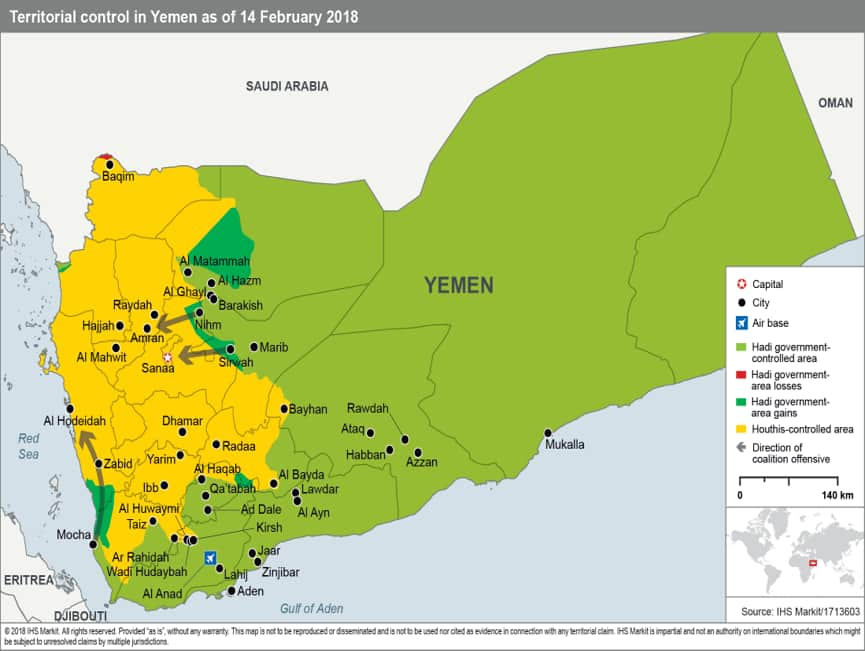Customer Logins
Obtain the data you need to make the most informed decisions by accessing our extensive portfolio of information, analytics, and expertise. Sign in to the product or service center of your choice.
Customer Logins
BLOG
Jul 26, 2018
Forecast review: Yemen
Forecast review
As part of our forecasting process we regularly review our analysis
to identify forecasts that leverage cross-IHS Markit resources and
best exemplify our indicator-led approach and the capabilities we
have developed including: local source network, influence mapping,
SOCMINT, control mapping, and risk numeration. The forecasts
identified through this process are used internally to allow us to
consistently monitor and enhance best practice across our regional
teams. Doing so ensures the transparency of our methodology and
robustness of our analysis.
For our clients, these ahead of the curve, compelling forecasts provide advanced warning of impending changes to the risk environment, allowing them to adjust their strategy or take decisions to mitigate against the identified risks.
Below is a recent example of a forecast captured through this process.
Yemen
Correct forecasts in written analysis in September and November
2017 (three months ahead of the curve) of the imminent collapse of
the alliance between former President Saleh and the Houthi movement
and the risk of fighting erupting in Sanaa and consequent
escalation of the civil war
- In December 2017, Houthis executed former president Saleh and fighting erupted in Sanaa for a week leading to more than 100 people being killed.
- After December 2017, the Yemeni civil war started to gradually escalate until the June 2018 offensive to capture the port city of Hodeidah launched by the Saudi-led coalition
- Unique forecast: At the time of the initial forecast, no international media or competitor was flagging this.
Key inputs to our analysis
- The production of a control map of Yemen to understand and visualize the dynamics of the conflict.
- Weekly discussions with local sources in our network, including a journalist who has access to both government officials and Houthis.
- SOCMINT analysis of Houthi social media accounts to identify changes in narrative and messaging

{"items" : [
{"name":"share","enabled":true,"desc":"<strong>Share</strong>","mobdesc":"Share","options":[ {"name":"facebook","url":"https://www.facebook.com/sharer.php?u=http%3a%2f%2fwww.spglobal.com%2fmarketintelligence%2fen%2fmi%2fresearch-analysis%2fforecast-review-yemen-72618.html","enabled":true},{"name":"twitter","url":"https://twitter.com/intent/tweet?url=http%3a%2f%2fwww.spglobal.com%2fmarketintelligence%2fen%2fmi%2fresearch-analysis%2fforecast-review-yemen-72618.html&text=Forecast+review%3a+Yemen+%7c+S%26P+Global+","enabled":true},{"name":"linkedin","url":"https://www.linkedin.com/sharing/share-offsite/?url=http%3a%2f%2fwww.spglobal.com%2fmarketintelligence%2fen%2fmi%2fresearch-analysis%2fforecast-review-yemen-72618.html","enabled":true},{"name":"email","url":"?subject=Forecast review: Yemen | S&P Global &body=http%3a%2f%2fwww.spglobal.com%2fmarketintelligence%2fen%2fmi%2fresearch-analysis%2fforecast-review-yemen-72618.html","enabled":true},{"name":"whatsapp","url":"https://api.whatsapp.com/send?text=Forecast+review%3a+Yemen+%7c+S%26P+Global+ http%3a%2f%2fwww.spglobal.com%2fmarketintelligence%2fen%2fmi%2fresearch-analysis%2fforecast-review-yemen-72618.html","enabled":true}]}, {"name":"rtt","enabled":true,"mobdesc":"Top"}
]}



